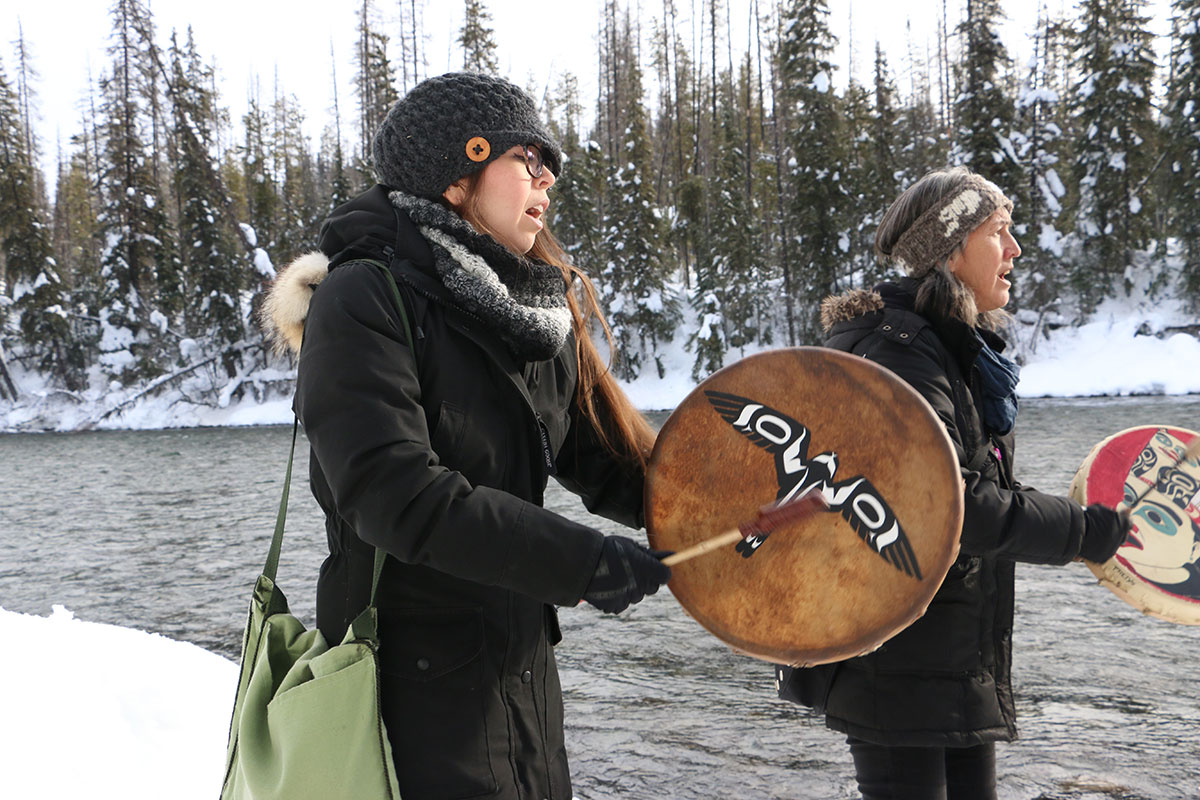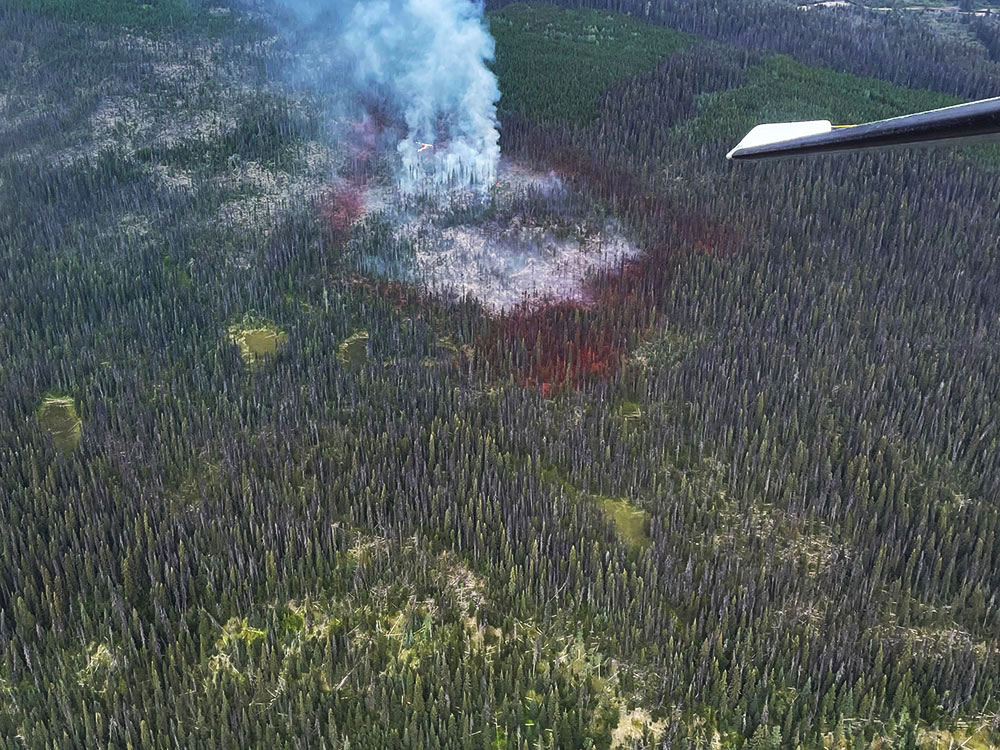Smoke-free skies above the Unist’ot’en Healing Centre, where BC Wildfire crews have worked for the past two days to bring a lightning-sparked fire under control, have raised hopes that an evacuation alert for the surrounding area might soon be lifted.
Several Wet’suwet’en homes and occupation camps in the area between Lamprey Creek, south of Houston, B.C., and the area north and west of Morice Lake were included in the alert, but it was unclear which, if any, Coastal GasLink work camps in the area were also affected.
It was a tense day this past Monday as healing centre occupants abandoned a work bee at the remote location nearly 70 kilometres southwest of Houston and prepared to leave at a moment’s notice.
“We called wildfire services right away to report it. They were pretty immediately responsive,” said Dr. Karla Tait, the healing centre’s director of clinical programming, who spoke to The Tyee from the centre Tuesday morning.
She said the fire, which is believed to have been sparked by a lightning strike 750 metres to the north, was spotted Sunday evening by a healing centre resident and reported immediately to BC Wildfire Service. Two fire trucks were dispatched from Houston, and crews spent the night preparing to fight the fire at first light Monday.
By Tuesday morning, the fire had grown to about five hectares and its status had been updated from “out of control” to “being held,” Northwest Fire Centre information officer Casda Thomas said.
One helicopter and 17 firefighters continued to work on the fire Tuesday, Thomas added, but it is not expected to spread beyond its current boundary.
The Unist’ot’en Healing Centre sits next to the Morice River, known to the Wet’suwet’en as Wedzin Kwa, and about a kilometre from the Coastal GasLink pipeline route, which is currently under construction through northern B.C.
Crews used pumps to draw water from Wedzin Kwa, Tait said, including connecting a rooftop sprinkler on the healing centre to the water source.
“The hard work paid off and Wedzin Kwa, beautiful water, protected us,” she said. “We’re very grateful for all the firefighters and amazing, life-giving water for keeping us safe.”
The healing centre has been the site of cultural and healing camps operated by the Unist’ot’en, a house group of the Wet’suwet’en Nation, for more than a decade. In 2015, construction began on a three-storey building at the healing centre, which was built entirely using volunteer labour, according to the centre’s website.
Opposition to pipelines through Wet’suwet’en territory began at Unist’ot’en Healing Centre more than a decade ago and it became the site of arrests in February 2020.

In addition to the Unist’ot’en Healing Centre, the evacuation alert area also includes Gidimt’en Camp, another Wet’suwet’en camp and feast hall 22 kilometres to the east, and a BC Parks campground at Morice Lake.
But it wasn’t immediately clear if Coastal GasLink work camps were included in the alert. The pipeline right-of-way, including the site where the company is preparing to drill under Wedzin Kwa, is about two kilometres from the Morice River wildfire and BC Wildfire Service confirmed that one of its camp accommodations sits 17 kilometres to the west.
TC Energy, the Calgary-based company that’s building the pipeline, responded to The Tyee’s questions by directing it to a statement posted to its website Tuesday where it said it is closely monitoring the wildfire situation in the Morice area.
“Our priority is always the safety of our workers, their families, local and Indigenous communities and first responders,” the statement reads. “We have advised members of the public within the vicinity of our work sites with information about the fire and are prepared to assist them should evacuation become necessary.”
The company said a contractor had provided four pieces of heavy equipment to the BC Wildfire Service to assist in the fire response and that fire crews are being housed at 9A Lodge, a work camp near the wildfire.
Pipeline construction continues, it added.
BC Wildfire Service said it had recommended an evacuation alert “for structures in the nearby area,” but directed The Tyee to the Regional District of Bulkley-Nechako for more information about the alert.
The regional district directed The Tyee to TC Energy for information about which work camps were included in the alert, but TC Energy did not respond to specific questions.
The company also did not respond to questions about the logistics of evacuating hundreds of workers housed at camps in the area. According to the project’s site map, 9A Lodge, a work camp that appears to fall within the evacuation alert area, housed 185 workers at the end of July. Nearly 500 additional workers were at P2 Lodge, a work camp farther west.
Both camps rely on the Morice Forest Service Road, which is within a kilometre of the Morice River wildfire, for access. The remote resource road has been the site of numerous anti-pipeline actions by the Wet’suwet’en Hereditary Chiefs and their supporters over the past several years.
When the road was blocked for several days by pipeline opponents in November, workers at the camps said they were not given the opportunity to evacuate.
At the time, a Gidimt’en Camp spokesperson said they had provided 10 hours’ notice for the company to remove workers from the area.
But in an email to The Tyee, TC Energy responded that it would not have been safe to do so.
“Notwithstanding that our work is lawful, authorized and permitted, demanding the evacuation of more than 500 people and equipment across forestry roads under inclement weather is unreasonable and unsafe,” the company said at the time.
It remains unclear how the evacuation difficulties the company cited in November would affect workers if a wildfire-related evacuation was required on short notice.
By late Tuesday, it appeared that a wildfire evacuation order, which would require people to leave the area, was unlikely — at least for now.
The Northwest Fire Centre warned that the region has experienced hot and dry conditions combined with lightning activity over the past week, conditions that are expected to continue in the coming days. Additional wildfires are expected and fire crews are standing by, Thomas said.
Wildfires can be reported by calling 1-800-663-5555 or *5555 on a cell phone, or through BC Wildfire Service’s downloadable app.
At the healing centre, Tait said that they had evacuated children and people with health concerns as a precaution and managed to book a hotel room in Smithers despite most hotels in the area being full.
“Some people did reach out offering their homes to us, which was very sweet. So, I think we would have been OK with our support network,” she said. “We just had to get ready and be prepared and know that belongings can be built up again, but people can't be replaced.” ![]()
Read more: Indigenous, Environment
















Tyee Commenting Guidelines
Comments that violate guidelines risk being deleted, and violations may result in a temporary or permanent user ban. Maintain the spirit of good conversation to stay in the discussion.
*Please note The Tyee is not a forum for spreading misinformation about COVID-19, denying its existence or minimizing its risk to public health.
Do:
Do not: